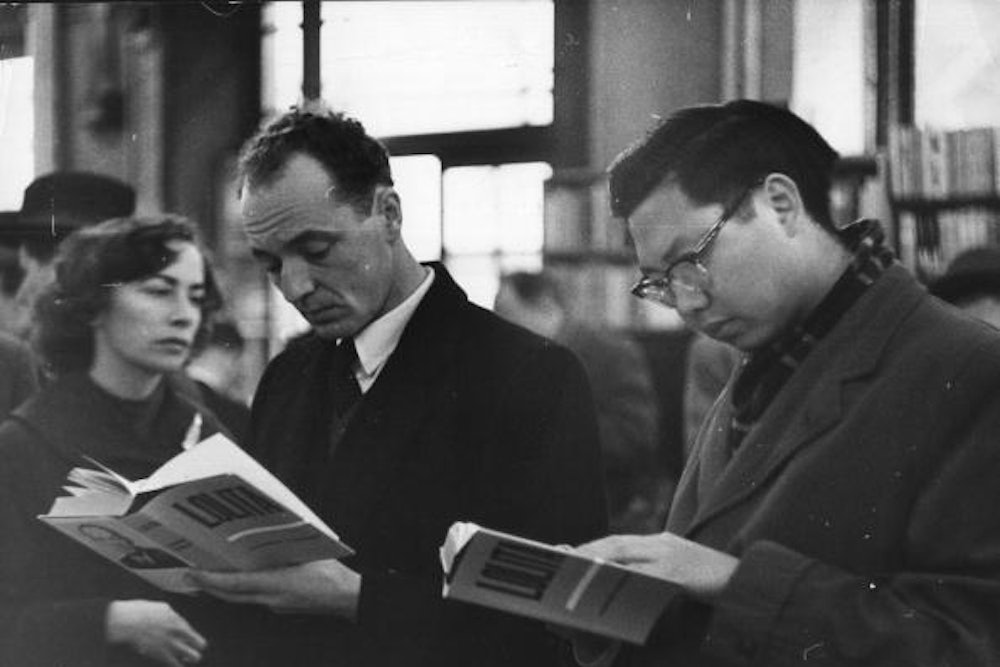Lolita (expurgated), by Vladimir Nabokov
Excerpted in The Anchor Review
Anchor Books; 95¢
The second Anchor Review, a pocket-sized magazine-and-reprint journal of high standards, mildly radical leanings and rare appearance, would be something to buy even without its 90-page excerpt from the notorious Lolita. But emasculated as it is, this first American edition of Vladimir Nabokov’s novel is a major literary event, worth all the attention we can spare. Circulated over here in its Paris edition, it moved one critic to say that “it flames with a tremendous perversity of an unexpected kind…” and is “…just about the funniest book I remember having read”; another critic to describe its action as “remorseless, simple and inevitable, like a Greek tragedy; or else a mass of absurdities, coincidences and perverse exfoliations, like a Greek tragedy”; a third critic to describe that “Lolita is partly a masterpiece of grotesque comedy, partly an unsubdued wilderness where the wolf howls—a real wolf howling for a real Red Riding Hood.”
When Nabokov’s first English novel, The Real Life of Sebastian Knight, appeared during the forties, Edmund Wilson wrote:
If I say that Nabokov, who was educated in England … turns out to be a master of English prose—the most extraordinary phenomenon of the kind since Conrad—this is likely to sound incredible. If I say that Nabokov is something like Proust, something like Franz Kafka, and, probably, something like Gogol, I shall suggest an imitative patchwork, where Nabokov is as completely himself as any of these others—a man with a unique sensibility and a unique story to tell.
To complete my chorus of witnesses, here is Mr. Nabokov himself (from an amusing essay on Lolita included by Anchor):
After Olympia Press, in Paris, published the book, an American critic suggested that Lolita was the record of my love affair with the romantic novel. The substitution ‘English language’ for ‘romantic novel’ would make this elegant formula more correct. But here I feel my voice rising to too strident a pitch. None of my American friends have read my Russian books and thus every appraisal on the strength of my English ones is bound to be out of focus. My private tragedy, which cannot, and indeed should not, be anybody’s concern, is that I had to abandon my natural idiom, my untrammeled, rich and infinitely docile Russian tongue for a second-rate brand of English, devoid of any of those apparatuses--the baffling mirror, the black velvet backdrop, the implied associations and traditions--which the native illusionist, frac-tails flying, can magically use to transcend the heritage in his own way.
This unwarranted fit of modesty on Mr. Nabokov’s part at least gives us a special clue to the genius of his book. Since he could not develop a style of this imputed weight, he did the next best thing and forged a prose of spectacular vitality and full of surprises. His Nicolai Gogol (New Directions, 1944) is the best treatise on comedy I know of, and a kind of book, one must remember when comparing the two men, that Gogol could not conceivably have written himself. In a test with Gogol, Mr. Nabokov makes up in learned wit what he lacks in poetry or control. He is nothing if not intelligent; the parallel with Gogol has to be found behind yet another set of ironic baffles, in a really fiendish, lyric delight in the bottom absurdity of things. But the parallel need not be drawn too far; Nabokov warns against it. He presents Gogol, in fact, as a monster of self-delusion as well as one of the supreme masters of Russian fiction. But he also shows, in this model of critical biography, a standard of comedy ( ‘ “ … one likes to recall that the difference between the comic side of things, and their cosmic side, depends upon one sibilant... “) that springs to wonderful life in Lolita.
What makes the book “flame,” I think, is first of all a love affair with the real America. (“Nothing is more exhilarating than philistine vulgarity. … I chose American motels instead of Swiss hotels or English inns only because I am trying to be an American writer and claim only the same rights that other American writers enjoy.”) It is an America where language and event make a seamless web of wonders, terrors, revelations and portents. English, for Mr. Nabokov, is an instrument for the wildest and most mysteriously fitting shifts of tone, the most cheerfully extraverted, slang-relishing, literate verbal tomfoolery.
Since the Anchor Lolita is purged of its fleshier parts, since the author defends himself very ably, and since to dwell on the book’s more lurid side is to connive with witlessness, I shall skip all this. Suffice it here to say that Lolita’s chief actor, Humbert Humbert, a Swiss “salad of racial genes,” is afflicted with about equal degrees of wit, ennui, taste and a hideously overt form of nympholepsy; the disease of Ruskin and Lewis Carroll given free and tender rein in a wilderness of American motels, suburbs and progressive institutions. Lolita is a burlesque of Freudianism that Freud would have had to enjoy. I can respect Fred Dupee’s view, in his Anchor Preface to the book, that “there is frequently a disquieting note of unresolved tension”; but am inclined to think that the burlesque takes one more turn, at least, than we would expect of any previous example of the “confessional novel” or “roman noir” (Mr. Dupee’s terms). All Mr. Nabokov has to confess, I think, is imagination enough to project the charms of a Phedre or Cleopatra into the skin of an odious suburban bobby-soxer. How perverse this is each reader must decide for himself; but few milder absurdities would have suited Mr. Nabokov’s mad purposes so well.
